Venezuela profile - Timeline
- Published
A chronology of key events:
1498-99 - Christopher Columbus and Alonso de Ojeda visit Venezuela, which is inhabited by Carib, Arawak and Chibcha peoples.
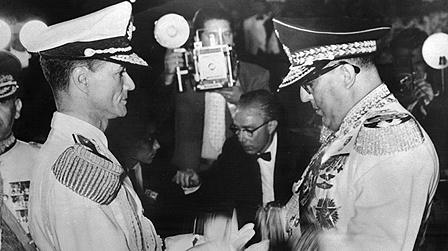
The coup leader of 1948, Marcos Perez Jimenez (r), was himself ousted 10 years on by Admiral Wolfgang Larrazabal (l) who restored civilian rule
1521 - Spanish colonisation begins.
1749 - First rebellion against Spanish colonial rule.
1810 - Venezuelans take advantage of Napoleon's invasion of Spain to declare independence.
1829-30 - Venezuela secedes from Gran Colombia.
1870-88 - Ruler Antonio Guzman Blanco attracts foreign investment, modernises infrastructure and develops agriculture and education.
1908-35 - Under dictator Juan Vicente Gomez, Venezuela becomes world's largest oil exporter.
1945 - Coup establishes civilian government after decades of military rule.
1948 - President Romulo Gallegos, Venezuela's first democratically-elected leader, overthrown within eight months in military coup led by Marcos Perez Jimenez.
Democratic rule
1958 - Admiral Wolfgang Larrazabal ousts Marcos Perez Jimenez; leftist Romulo Betancourt of the Democratic Action Party (AD) wins presidential election.
1973 - Venezuela benefits from oil boom and its currency peaks against the US dollar; oil and steel industries nationalised.
1989 - Carlos Andres Perez (AD) elected president amid economic depression, launches austerity programme with IMF loan. Riots, martial law and general strike follow, with hundreds killed in street violence.
1992 - Colonel Hugo Chavez and supporters make two coup attempts. Some 120 people killed in suppression of coups, Col Chavez jailed for two years before being pardoned.
1993-95 - President Perez impeached on corruption charges.
Rise of Chavez
1998 - Hugo Chavez elected president amid disenchantment with established parties, launches 'Bolivarian Revolution' that brings in new constitution, socialist and populist economic, and social policies funded by high oil prices, alongside increasingly anti-US foreign policy.
2001 - President Chavez uses enabling act to pass laws aimed at redistributing land and wealth. Concern grows in business and some labour circles that he is trying to concentrate economic and political power.
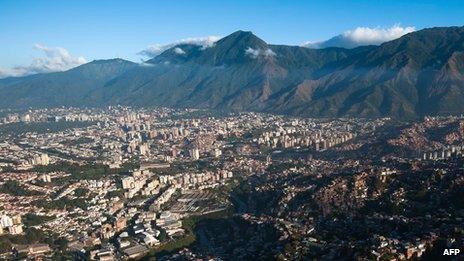
The capital Caracas sprawls along the foot of high mountains
2002 April - Armed forces rebel over violent stand-off between government and state oil monopoly after appointment of new board.
President Chavez taken into military custody, but interim government of business leader Pedro Carmona collapses and Hugo Chavez returns to office.
2005 January - President Chavez signs decree on land reform to eliminate Venezuela's large estates and benefit rural poor. Ranchers say move is attack on private property.
2005 March - New media regulations provide stiff fines and prison terms for slandering public figures.
2005 December - Parties loyal to President Chavez dominate parliament after opposition parties boycott election.
Russian alliance
2006 July - President Chavez signs a $3bn (£1.6bn) arms deal with Russia, including an agreement to buy fighter jets and helicopters, marking a re-orientation away from US arms supplies.
2006 December - Hugo Chavez wins a third term in presidential elections with 63% of the vote, the largest margin since the 1947 election.
2007 January - President Chavez announces key energy and telecommunications companies will be nationalised under 18-month enabling act approved by parliament.
2007 June - Two leading US oil companies, Exxon Mobil and ConocoPhilips, refuse to hand over majority control of their operations in the Orinoco Belt to the Venezuelan government, which then expropriates them.
2007 December - President Chavez suffers his first defeat at the ballot box, when a referendum narrowly rejects proposals to increase government control over the Central Bank and the power to expropriate property.
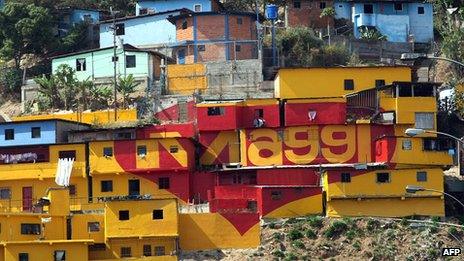
Poor district in Caracas - President Chavez poured money into social programmes
2008 September - Venezuela and Russia sign oil and gas cooperation accord. Russian warplanes visit Venezuela, with Russian warships heading there for November joint exercises - first return of Russian navy to Americas since Cold War.
2008 October - First Venezuelan telecommunications satellite launched from China.
2009 February - Voters in a referendum approve plans to abolish limits on the number of terms in office for elected officials. This allows President Chavez to stand again when his term expires in 2012.
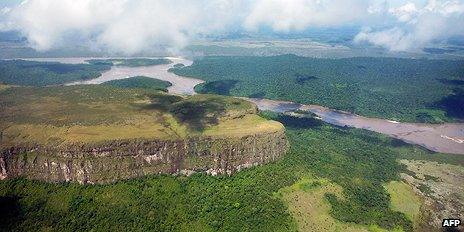
Much of southern Venezuela is tropical wilderness
Economic problems
2010 January - President Chavez devalues the bolivar currency to boost revenue from oil exports after economy shrank 5.8% in last quarter of 2009.
2010 September - Parliamentary elections. Opposition makes significant gains.
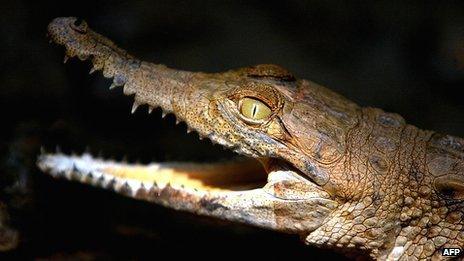
Endangered species: the Orinoco Crocodile
2012 April - Government extends price controls on more basic goods in the battle against inflation. President Chavez threatens to expropriate companies that do not comply with the price controls.
2012 July -After a six-year wait, Venezuela becomes a full member of regional trading bloc Mercosur, and is given four years to comply with the bloc's trading regulations.
2012 October - President Chavez wins a fourth term in office.
President Chavez dies
2013 April - President Hugo Chavez dies at age 58 in March after a battle with cancer. Nicolas Maduro, his chosen successor, is elected president by a narrow margin. The opposition contests the result.
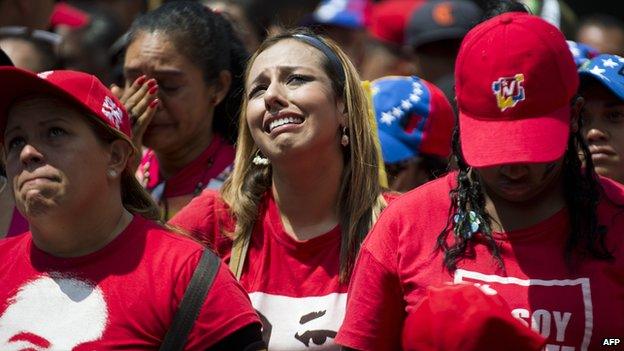
Chavez supporters thronged the streets of Caracas during the funeral cortege of the late president in March 2013
2014 February-March - At least 28 people die in suppression of anti-government protests.
2014 November - Government announces cuts in public spending as oil prices reach a four-year low.
2015 December - Opposition Democratic Unity coalition wins two-thirds majority in parliamentary elections, ending 16 years of Socialist Party control.
2016 September - Hundreds of thousands of people take part in a protest in Caracas calling for the removal of President Maduro, accusing him of responsibility for the economic crisis.
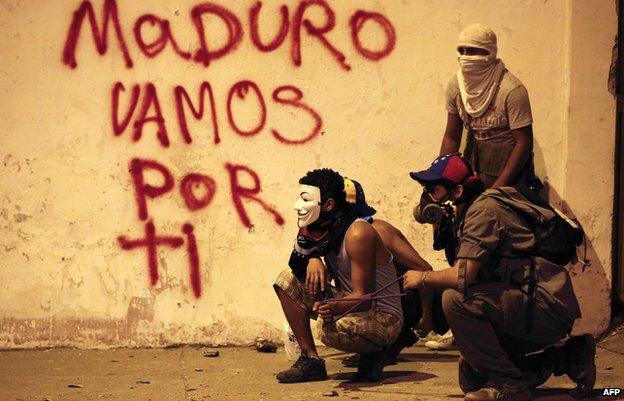
Some Venezuelans' dissatisfaction with the Maduro government spilled over into protests in 2014
2017 July - Controversial constituent assembly elected in the face of an opposition boycott and international condemnation.
2018 May - Opposition contests the official victory of President Maduro at presidential elections.
2018 August - UN says two million Venezuelans have fled abroad to neighbouring countries since 2014.
2019 January-February - Opposition leader Juan Guaidó declares himself interim president, appeals to military to oust President Maduro on the grounds that the 2018 election was rigged.
European Union, United States, and most Latin American countries recognise Mr Guaidó.
2020 December - Opposition boycotts legislative elections, which are duly won by President Maduro's party and allies.